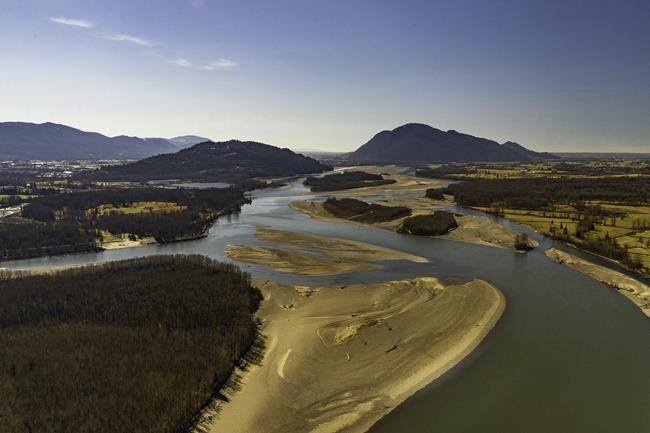
A stretch of the lower Fraser River near Chilliwack, B.C. is seen in this undated handout photo. An important salmon habitat area in British Columbia's lower Fraser River area will be protected with the purchase of an island near Chilliwack by an environmental organization. THE CANADIAN PRESS/HO, Fernando Lessa *MANDATORY CREDIT*
Republished July 09, 2024 - 4:51 PM
Original Publication Date July 08, 2024 - 1:06 AM
VANCOUVER - An ideal natural salmon habitat of gravel beds and side channels on British Columbia's lower Fraser River will be protected by the purchase of a private island by an environmental organization, with the help of the federal government and private donors.
The deal to buy the 248-hectare Carey Island near Chilliwack is a "big win for conservation" in the important ecological area between Mission and Hope known to environmental groups as "the Heart of the Fraser," Steven Godfrey, Nature Conservancy of Canada West Coast program director, said Monday.
The conservancy announced it had bought the island off Carey Island Farms Ltd., which was using it to grow corn.
Godfrey said up to 90 per cent of the gravel shoreline of the lower Fraser River from Hope to Mission had been subject to some form of development.
"The shorelines have been impacted to things like shoreline armouring from the construction of dikes, and so much of that land base has been changed to farmland or other human uses," he said in an interview from Ladysmith.
"There's not a lot of decent usable or privately available land that still offers good habitat value for salmon and for sturgeon and other aquatic species," said Godfrey.
Carey Island is one of the last salmon habitat strongholds, providing gravel beds and pools for natural spawning and rearing areas during spring runoff for salmon and other species, including endangered sturgeon, he said.
"It's something we've had our eye on for a while and have been seeking to build relationships in the area to understand what are the big pieces that would be a big win for conservation, and Carey Island is one of them," said Godfrey.
The purchase for about $8 million was made possible by contributions from individuals, foundations and other donors, with $4 million from Environment and Climate Change Canada, which represented almost half the total cost, he said.
Federal Environment Minister Steven Guilbeault said the Carey Island purchase protects crucial lower Fraser River riverbed habitat for salmon.
"These investments through the Canada Nature Fund, working with the Nature Conservancy of Canada, are part of our national conservation campaign to protect 30 per cent of land and water in Canada by 2030," he said in a statement.
Sto:lo Nation elder Eddie Gardner said area First Nations are working jointly with conservation groups, including the Lower Fraser Fisheries Alliance and Watershed Watch Salmon Society, to restore, conserve and preserve the lower Fraser River's salmon habitat.
"In the spirit of reconciliation, we have a golden opportunity to collaborate with others to undertake this work for the benefit of current and future generations in honour of our ancestors," he said in a statement.
The island is one of the last largely intact areas of gravel beds along the lower Fraser River and will provide valuable habitat for migrating young salmon, said Lina Azeez, Watershed Salmon Watch Society habitat program director.
"We had feared the worst for the future of Carey Island before the Nature Conservancy of Canada stepped in to purchase the property," she said in a statement. "Seeing what has happened to other gravel islands we expected to see Carey Island deforested, ditched, drained and diked, essentially removing it from the floodplain and losing all the benefits of a floodplain island to its surrounding environment."
Canadian river conservationist Mark Angelo said in a statement the Carey Island area provides increasingly rare habitat for young salmon seeking refuge from high river flows every spring.
"The acquisition of Carey Island by the Nature Conservancy of Canada is a major step forward in efforts to better protect the heart of the Fraser, one of the most productive stretches of river on the planet," said Angelo, an Order of Canada recipient in recognition of his river conservation efforts.
– By Dirk Meissner in Victoria
This report by The Canadian Press was first published July 8, 2024.
News from © The Canadian Press, 2024